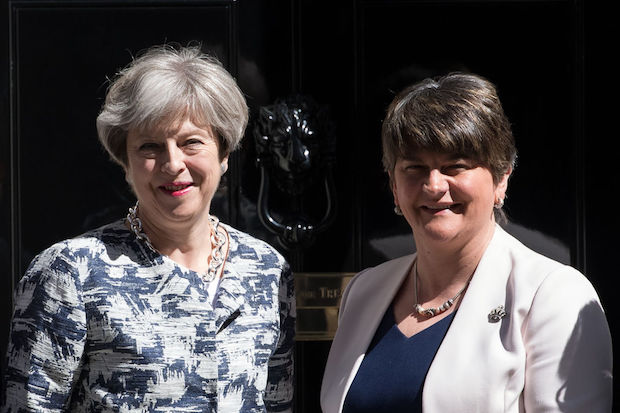Arlene Foster has been the leader of the Democratic Unionist Party (DUP) since December 2015, and the Member of the Northern Ireland Assembly for Fermanagh and South Tyrone since 2003.
In this interview, Foster discusses the DUP’s unlikely alliance with the Mrs May’s Conservative Party; why the DUP would not strike a deal with Labour anytime soon, and the British media’s ill-conceived perception of her party.
After the last UK general election, Foster was thrown into the political spotlight after Theresa May entered into a ‘confidence and supply deal’ to prop up the Conservative minority government with her 10 MPs, as the DUP are now the fifth largest party in the House of Commons.
This unlikely partnership has caused a bit of a stir in the British media, not only due to what the DUP stand for, but also thanks to a lack of information about where they have come from.
Foster explains:
‘I think the problem lies in that not much was known about the DUP until the ‘confidence and supply deal’ with the Conservative Party, as we (DUP) are based in Northern Ireland and we also weren’t part of any major debates, unlike Plaid Cymru or the SNP, during the UK general election. So people have just relied on the media [to educate themselves about the DUP]. The British media have tried to associate the DUP with some sort of paramilitary force.
I have myself have been the victim of IRA violence. My father was shot by the IRA, so I disapprove of any violence of the paramilitary type. I think it is absolutely wrong that we are being portrayed in that way.
We are a democratic party, we work for democracy and we believe firmly in democracy… this is an opportunity that has come to us because of the UK general election result. We want to do what is right for the nation as a whole and what is right for Northern Ireland.’
Foster believes the DUP has a lot to offer Westminster and the UK as a whole:
‘From the mid-1970s to 1980s when I was growing up is totally different to now, where there is foreign direct investment. For example, we are the best performing region in the UK for the last couple of years and we want to remain in terms of the economy and see that grow. And the way to that is to invest in infrastructure.
That is why we were very pleased with the “confidence and supply” agreement with the Conservative party, because we want to be in the position in the future that we are not reliant on Westminster. We want to be part of the national regional exchequer and contribute.’
Foster acknowledges that the current political climate is a tough one not only for her party but the Conservatives, due to the ongoing Brexit negotiations.
‘We want to leave the European Union in a planned way that will leave the United Kingdom in a stronger position. We still want to remain a global leader [after leaving the European Union].
On whether she thinks the Brexit deal will threaten the peace process, she is defiant:
‘I think that is one of the most disgraceful things that has been thrown up [in the media]. Why would it? We are bringing £1.5 billon of spending power to Northern Ireland. I would have thought that would have cemented [stability and prosperity] in Northern Ireland.’
Foster seems committed to her relationship with the Conservative party:
‘We have made a deal with the Conservative Party, with the whole of Parliament, for however long that may be. We have said we will support them in confidence in budgetary motions and of course there are things that we won’t support. I actually think this is a good agreement for the whole nation and gives stability at a time we do face big challenges particularly in and around the European Union.’
However, Foster cannot see herself or her party ever making an alliance with the Labour Party, especially if Jeremy Corbyn is leader:
‘In the past, we have worked with the Labour Party [in 2010]. Gordon Brown tried to broker a deal with the DUP back then after a hung parliament. But at the moment, Labour is led by Jeremy Corbyn – a man who not only supported Sinn Fein and the IRA in the worst of the troubles, but also presents himself to be some sort of “peace broker”, when he is nothing of the sort. It would be an anathema for those of who lived through those conflicts to be connected with somebody who supported the IRA.
It is well known that Corbyn sides with other terrorist organisations like Hamas. There are also many claims of anti-Semitism within his party which he needs to address. From our perspective, we couldn’t share power with someone who was supportive of terrorism whilst we were fighting for democracy.’
Foster is also determined to shrug off the negative attention she has received from the media about the DUP’s stance on same-sex marriage:
‘We [DUP] believe in the Church’s definition of marriage as it currently stands, which doesn’t mean we are anti-gay or homophobic, as the media portrays.’
This interview took place on July 14 2017 before the recent breakthrough in Brexit negotiations.
A version of this interview appeared on financial aggregator website wallstreetwires.com.






Comments